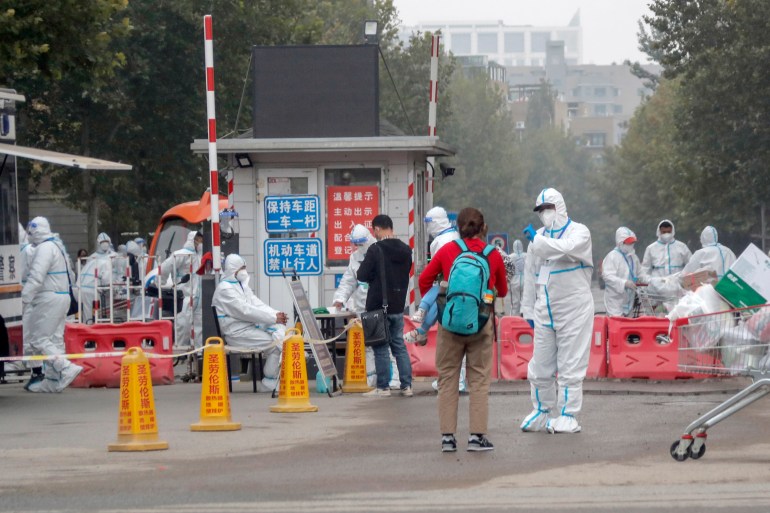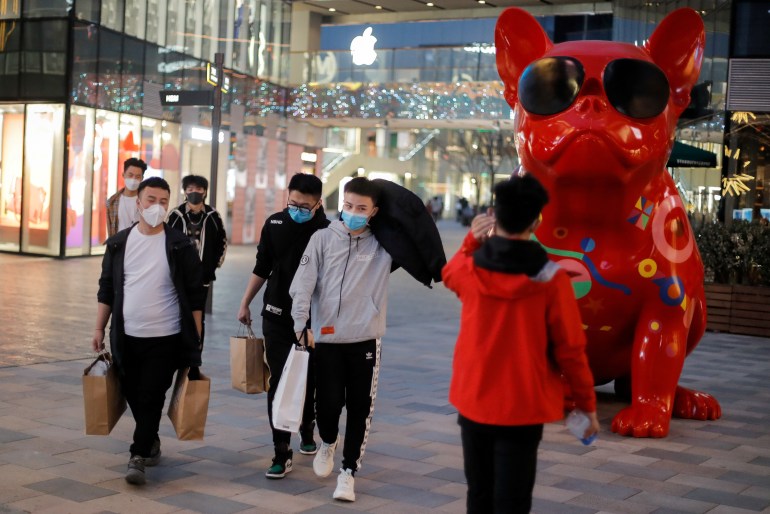China’s Singles’ Day kicks off as COVID, real estate crisis bite

Beijing, China – For 33-year-old Li Bingwen, this year’s Singles’ Day promises to be a subdued affair. The office worker from Shanghai won’t be able to open any of the packages he ordered during the November 11 shopping event until he completes 14 days of quarantine.
While on a business trip, Li had to self-isolate in a hotel more than 400km away from his home after authorities detected a handful of COVID-19 cases in the surrounding province.
Keep reading
list of 4 itemsAs COVID-19 rages, more in Singapore go hungry
India battles spike in dengue cases amid COVID pandemic
‘It’s not jabs that are in short supply, it’s arms’
“I actually have a green health code and the result of my nucleic acid test is negative,” Li told Al Jazeera, expressing his frustration with the local government’s ultra-strict pandemic rules.
While Li doesn’t go in for the buying frenzies associated with many of his compatriots, he does plan to take advantage of the cut-price deals on offer.
“I would just buy annual gifts for friends or some football jerseys,” Li, who asked not to be referred to by his real name, said.
Singles’ Day, the world’s biggest shopping event, takes place under a cloud of uncertainty this year as recent COVID-19 outbreaks, power shortages and a burgeoning property market crisis threaten to dampen consumer spending.
Originally conceived by Chinese students as an alternative to Valentine’s Day for singles, “Double 11” has over the last 10 years evolved into the ultimate celebration of consumer spending. Internet empire Alibaba held the first event in 2009 to take advantage of China’s booming e-commerce sector, with just a few dozen brands taking part in the discount battle.

Last year, Alibaba earned a record-breaking 498.2 billion RMB ($78bn) in the 11-day period surrounding the event – an amount greater than the gross domestic product (GDP) of Bulgaria. In total, almost four billion packages were delivered to customers.
More than 290,000 companies are believed to be participating in the online shopping festival this year, offering some 14 million discounts and special offers.
Despite COVID-19 cases being largely under control in China, the pandemic continues to cause significant disruption to people’s lives. The National Health Commission has reported more than 1,000 infections since the latest wave began in mid-October. Authorities reported 39 cases on Wednesday, down from 54 the previous day and 62 on Monday.
Because of a strict-zero COVID mandate, the authorities have responded to even small clusters of infections with strict lockdowns and nationwide travel restrictions, hitting the bottom lines of businesses and consumers.
As China grappled with its worst COVID-19 outbreaks since the start of the pandemic, retail sales in August grew just 2.5 percent, according to the National Bureau of Statistics, well short of market expectations and sharply down from 8.5 percent the previous month.
Real estate crisis
In September, the state-run Global Times tabloid newspaper quoted Wang Jun, an economist at Zhongyuan Bank, describing slowing consumption as the “biggest weakness” of China’s economic recovery after the pandemic.
Last month, Chinese media outlet Caixin warned that domestic consumer spending could suffer a “long COVID” contraction, citing, among other issues, the real estate crisis centred around indebted property giant Evergrande.
Up to 80 percent of household wealth in China is invested in property, making the health of the real estate market integral to people’s pocketbooks. Household consumption in China accounts for just 39 percent of GDP, compared with 55 percent or more in many developed economies, according to official data.
After a rapid recovery in 2020, economic growth slowed in the third quarter to just 0.2 percent, the weakest showing in a year. GPD rose 4.9 percent year on year. In September, Nomura cut its growth forecast for the Chinese economy from 8.2 percent to 7.7 percent.
The financial services group had in August cut its forecast from 8.9 percent, citing the Chinese government’s “draconian measures” against COVID-19 as a factor weighing on growth.
Alibaba, which is under scrutiny as authorities crack down on the power of big tech firms and Chinese President Xi Jinping promotes “common prosperity”, has noticeably toned down its promotion of the event compared with previous years.
The e-commerce giant’s annual gala for the event took place online due to COVID-19 outbreaks across the country. The firm has also pledged a greater focus on environmental sustainability and charitable endeavours.

In the capital, signs of economic sluggishness aren’t hard to find. Visitors to the glitzy Sanlitun district in downtown Beijing these days are initially greeted by mesh barriers and black-uniformed security guards with Soviet-style fur caps.
Shoppers cannot enter the outdoor shopping mall complex without presenting a “green health code” on their smartphone and submitting to a body temperature check. Except for a newly opened Uniqlo flagship store, most shops are unusually empty, with bored staff often the only people present.
While people are noticeably avoiding shopping districts, analysts still expect Singles’ Day to do prominent sales figures – although growth may be modest compared with previous years.
Houze Song, research fellow at the Paulson Institute in Chicago, said he expected to see a similar sales performance as last year.
“Especially since there are daily COVID cases up to 50 per day, that’s pushing more consumption demand online,” Song said.